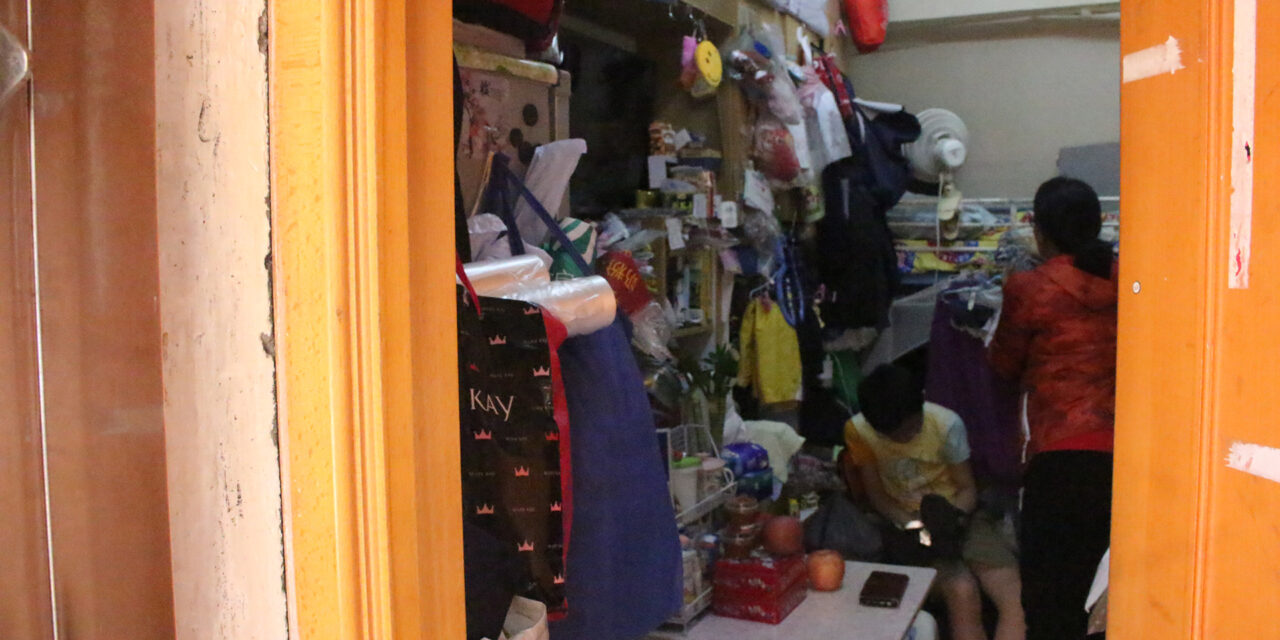HKU Journalism and Media Studies Centre
HONG KONG – Every time they enter their subdivided apartment, Mandy Wong and her 13-year-old son must remove their backpacks, hold them in their hands, and squeeze carefully through the doorway which opens no more than 12 inches wide, leading to an oppressively narrow corridor.
Down the hallway, in a cramped, sweltering, and damp 6-square-meter room in Sham Shui Po, Hong Kong’s “slum,” Wong lives with her son Steve, who will soon enter middle school. Their room is sparsely furnished, containing only a bunk bed and a small desk. Just half a step away, the kitchen area is cramped, nestled right next to the toilet. With no extra space available, Wong has to hang everything on the walls, which makes the already tiny room feel even more constricted.
In the sweltering heat of summer, Hong Kong’s mercury can soar to a scorching 36 degrees Celsius. Within the confines of this windowless room, only two small fans whirl, offering a semblance of relief and a feeble attempt at circulating the stifling air. The pervasive dampness and oppressive heat bring unwelcome but frequent visitors – cockroaches and rats.
Despite its dire sanitation conditions, this is the cheapest accommodation the single mother could find in the city. Located not far from Steve’s school, it is comparatively cheaper than housing in other areas of Hong Kong, but still exorbitant for a family surviving on monthly government assistance.
“Indeed, it’s a small room, but it’s the best we could find,” Wong admitted. “Steve is growing taller every day, and he’s starting to ask for more privacy. Unfortunately, that’s a luxury we can’t afford right now.”
Originally from Guangdong province in mainland China, Wong is jobless not out of choice but necessity, as her lack of a One-Way Permit – which are issued to mainland spouses of Hong Kongers – prevents her from obtaining a Hong Kong Identity Card and employment. Her Hong Kong-born husband vanished overnight five years after bringing her to the city, and never bothered to help her apply for the permit, leaving her and her son to fend for themselves. With the aid of various charities, Wong has barely managed to scrape by.
Wong is not alone. A well-known NGO estimates there are about 50 mainland wives in a similar predicament. While they are allowed to come to Hong Kong on short-term visitors’ permits after getting married, they cannot gain permanent residency and the right to work here, without the One-Way Permit. To obtain the permit, they must have the signature of their husband on the application forms and he must be there for the entire process.
Without the permit, mainland single mothers face significant challenges in accessing employment and residency in Hong Kong and an uncertain future.
These 50 single mothers, whose husbands have abandoned them, have garnered attention by proactively seeking assistance from various organizations. But Wong speculates that there may be additional single mothers facing similar circumstances who opt to remain hidden due to their inability to articulate their plight to the broader community.
The outbreak of the COVID-19 pandemic in 2019 has dealt a further blow to these families already grappling with poverty. Many of the single mothers, struggling to make ends meet, have found themselves burdened with debts exceeding tens of thousands of Hong Kong dollars, merely to cover basic living expenses. As a result, providing adequate food and clothing for their children has become an even greater challenge. And despite years of pleading with the governments of Hong Kong and Guangdong province, where many of them are from, there seems to be no resolution of the legal limbo they find themselves in.
“Every month, we have to go to the nearby church to collect some relief oil, rice, and other food,” Wong said. “Whether we like it or not, we have to accept it and can only eat these things. We have no other choice.”
Juggling parenthood and financial despair
Reflecting on her initial meeting with her husband, Wong ’s expression dims, her tone detached as if recounting someone else’s story. In 2010, then 33 and facing mounting social pressure as an “old” unmarried woman in her hometown, Wong found solace in online conversations on “QQ,” a popular social media platform developed by Tencent. Soon, a stranger from Hong Kong began to woo her with rapid affection. Despite him being nearly 20 years her senior and a divorcee, he swept her off her feet. The whirlwind online romance led to her coming to Hong Kong with a visitor’s permit, and marrying him by October, just three months after they met in July.
No lavish banquet was held; the newlyweds merely dined quietly with close friends to mark their union.
The following year, Steve was born in Hong Kong. Under the city’s birthright laws, he immediately gained permanent residency rights, but Wong ’s husband never bothered to help her apply for a One Way Permit to qualify for permanent residency.
One cold January night in 2013, in a fit of rage, he threw Wong and their son out on the street, along with all their belongings, and vanished back to the neighboring mainland Chinese city of Shenzhen.
Stranded without a One-Way Permit, Wong could not work. Despite considering a return to mainland China, she soon gave up the idea because Steve’s Hong Kong identity wouldn’t allow him to enjoy free compulsory education there. And the prohibitive cost of private schooling for him in the mainland would be unaffordable for her. They returned to Hong Kong, and began living on government assistance.
“I once exerted great effort to have the police find my disappeared husband, hoping he would agree to sign my One-Way Permit application or grant a divorce,” Wong recalls tearfully. “But even when they found him, privacy laws in Hong Kong prevented them from sharing any details with me. I felt utterly hopeless.”
For mothers like Wong , their struggle is characterized by a prolonged and agonizing wait, as eligibility for a One-Way Permit, without the husband’s consent, is restricted to individuals “aged 60 or above without children in the mainland, and who are dependent on children over 18 residing in Hong Kong or Macau,” according to criteria outlined on the official website of the Chinese National Immigration Department in the mainland, where the process of applying for the permits must begin.
“I’m in my 40s now; waiting another decade for a permit makes no sense. We can barely afford meals, and my son, entering his growth spurt, needs more than we can provide. Waiting is a luxury we cannot afford,” Wong said.
For Wong and her son, life’s hardships seem endless, a series of cruel jokes with no respite in sight. With the outbreak of COVID-19 in 2020, the cost of living in Hong Kong began to climb relentlessly. In this city heavily reliant on imported goods for daily life, stringent pandemic containment measures have triggered price hikes across essential commodities and services. Items such as food, clothing, and other necessities have seen notable increases in cost, further burdening residents. Moreover, the demand for personal protective equipment and hygiene products has emerged as an additional expense in the new normal.

All the belongings of Mandy Wong and her son are stuffed in this small room. Photo by Jack Deng
To make ends meet, Wong borrowed over HK$100,000 from friends and family in the past two to three years.
“I remember after the pandemic, the government launched a consumption voucher scheme, giving money to every Hong Kong resident. Ironically, my son and I didn’t receive a cent because I’m not a resident, and he’s a resident under 18 , ” Wong said. “During that time, everyone was spending at supermarkets or malls, and the prices at the small stalls where I usually shop soared, making it impossible for us to afford even basic groceries.”
Often, their meal for half the day would be just two pieces of “fa gao”—a fluffy steamed bread from Guangdong, which is clearly insufficient for their nutritional needs, but they have no choice.
Pandemic plight
In 2023, the non-governmental charity group Society for Community Organization (SoCO) released a report on the impact of the pandemic on single-parent families like Wong ’s with a parent from the mainland. The report highlighted that nearly half of the children from the fifty families surveyed were getting only two meals a day, and only 28.9% had three, but in small portions, often going hungry.
Twenty percent could only eat their fill by obtaining free food, according to the survey. The parents relied on handouts (86.5%), skipped their own meals to feed their children (80.8%), ate expired food (61.5%), reduced meal portions (48.1%), and sometimes went completely without meals (23.1%). This chronic poverty among the children posed serious developmental risks to them, including cognitive delays and emotional and social maladjustment, according to the survey.
The survey also found that the median monthly income of these families was well below the poverty line, worsened by the pandemic’s economic fallout, making them prime candidates for targeted poverty alleviation by the government.
Wong and her son fall into this category.
Wong receives around HK$6,000 in government relief funds per month, but after deducting rent and basic living expenses for two people, she finds it difficult to save any money. If Steve suddenly falls ill, she can only take him to the public hospital’s emergency room and wait in line. Fortunately, Steve is exempt from school fees under the compulsory education policy in Hong Kong, which reduces a lot of the burden on her.
The report criticized the government’s failure to identify and prioritize these families for long-term relief measures.
Charity tries to help mainland mothers
Sze Lai-shan, a social worker from SoCO, has been aiding these mothers for years with limited success.
“We’ve often helped them write letters to government officials or even meet directly with high-ranking officers in Hong Kong, but to little effect,” Sze said.”The ultimate barrier lies with the mainland’s public security offices—if they don’t agree, there’s nothing we can do.”
Sze suggests that if the mainland government does not agree to implement specific policies for these single mothers, then it’s even less likely that the Hong Kong government will agree.
Sze regularly organizes gatherings for the single mothers, assisting them with daily necessities and coordinating donations from charities and local churches for school uniforms and books to alleviate their immediate needs.
But poverty’s shackles weigh heavily on the single mothers and their children, especially due to rising inflation. According to SoCO’s 2023 data, during the pandemic, not only did Hong Kong’s prices refuse to fall, but 73.1% of the surveyed single-parent families reported an increase in household expenses. This rise included a general inflation of consumer prices (reported by 86.5% of the survey respondents), increased sheltering at home and pandemic supplies expenditures for children (53.8%), and medical costs (51.9%). With reduced incomes and insufficient government assistance, these families struggled to cope.
To cut costs, families resort to desperate measures: most shop for groceries just before markets close, to snag last-minute discounts. Nearly half halted or reduced their children’s extracurricular activities, and half of them reduced meal sizes or the number of meals. Some even borrow money from friends or collect cardboard to sell to recycling centers, with over 10% of respondents reported doing so. The dire financial situations undeniably strip children of the opportunity to engage in enriching activities, affecting their holistic development, according to SoCO’s report.
Building solidarity
The women have banded together, forming a small support network to aid one another. When they come across discarded furniture on the streets, for example, they alert each other, seizing the opportunity to acquire much-needed items.
Near Wong ’s home, another mother-son duo face a similar plight, living in a cramped top-floor room. Like Mandy Wong, they survive on minimal government assistance and rent subsidies, which barely cover their rent and essential living expenses.
The mother, also surnamed Wong butrequested that her full name not be used for privacy reasons, said her 16-year-old son, a once cheerful boy, turned introspective and quiet after moving to Sham Shui Po.
“Once, he spent over seventy dollars on a meal with his classmates and I had to scold him when he came home,” Wong said tearfully. “It’s not that I don’t want him to eat well; it’s just that I can’t afford such expenses.”
She said her husband, a Hong Kong resident who brought her and their son to the city in 2013, refused to help her integrate by teaching her Cantonese or signing her One-Way Permit application. This untenable situation collapsed in 2018 after she discovered his infidelity, and he kicked them out.
Living on the eighth floor of a building without an elevator, she sees a silver lining in their daily climb: “It’s exhausting, but it keeps us fit and makes our sunny apartment more affordable.”
Fruitless appeals
The two women have attended meetings organized by SoCO. They have had the opportunity to meet with numerous officials from Hong Kong’s Immigration Department and even former Chief Executive Carrie Lam, but their pleas have been met with bureaucratic responses.
“Talking to the Hong Kong government gets us nowhere,” Mandy Wong said. “I’ve met Carrie Lam, and their responses are all the same — promises with no follow-up. We’re tossed back and forth between the Hong Kong side, which tells us to turn to the mainland authorities, and the mainland, which sends us back to the Hong Kong Immigration Department. We feel like a ball being kicked around.”
She recounted how she wrote numerous letters to the Mainland Public Security Bureau, and although her application for a single-entry permit was initially processed smoothly, it was eventually denied. The Hong Kong Immigration Department suspected her marriage was ‘suspiciously’ arranged, leading to the refusal.
“At that moment, I felt as if the sky had fallen. My son and I were left completely isolated, as the Immigration Department did not conduct any investigation, nor did they even bother to call me,” Mandy Wong said with frustration.
In June 2023, at a meeting organized by Sze for single mothers with immigration officials, she questioned the officials on their inaction, only to be met with prolonged silence.
When attempts were made by this reporter to contact the Immigration Department for comments, it gave only the standard reply: “The Immigration Department will not comment on individual cases… Subject to the circumstances, cases may be referred to mainland authorities for their consideration.”
Inquiries sent to the Public Security Bureau of Guangdong province have gone unanswered.
The Equal Opportunities Commission, a statutory body tasked with enforcing anti-discrimination ordinances in Hong Kong, has indicated that this matter falls within the purview of the Immigration Department.
Hope amidst hardship
In Hong Kong’s poorest neighborhoods, mainland mothers like the Wongs find themselves caught in a cycle of waiting and praying. Despite their resilient efforts, their cries for help seem to vanish into the abyss of bureaucratic indifference.
The woman who wanted to be identified only by her surname Wong shares tales of dashed hopes among their peers, but she herself hasn’t given up hope completely.
“Though I’ve lost faith in the government, I still attend Miss Sze’s monthly meetings, hoping for a glimmer of progress or change,” she said, her tone a blend of hope and skepticism.
Yet, whether it’s waiting to turn 60 to qualify for the One-Way Permit or for a miraculous shift in government policy, such aspirations remain distant dreams for these families.
The once-vibrant community of mothers tirelessly penning letters to local officials, rallying for change, has dwindled. For many, numbness has become the sole solace, a coping mechanism as they face relentless adversity and lack of progress
As an eternal optimist, she sets aside 20 Hong Kong dollars each month for herself. With this modest sum, she indulges in small luxuries: perhaps a couple of artificial flowers or a poster to adorn the walls of her eighth-floor walk-up apartment.,.
“Perhaps when my son is older and able to work, our situation might improve,” she muses.
As for Mandy Wong, she’s focusing on taking care of her son’s daily needs. But whenever she has free time, she still writes letters to government offices and contacts Ms. Sze and other NGOs to see if anyone can help her on her case.
“Besides waiting, it feels like there’s nothing else we can do,” Mandy Wong said, her voice tinged with resignation.
Advisor: Cindy Sui

